
 |
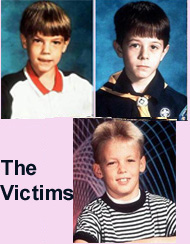 |
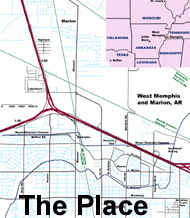 |
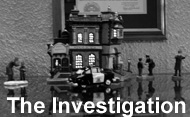 |
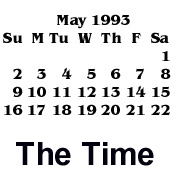 |
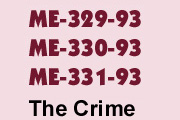 | 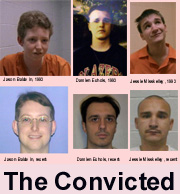 |
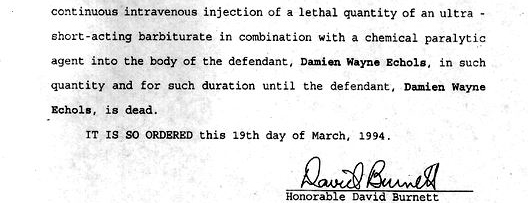 Order of Execution, Damien Echols. Echols received three death sentences. Echols Versus Ridge, Round Two Demons Various statements by Echols which were said to be related to demonism, Satanism, Wicca or the occult were used to impeach his character and offer evidence of the cult nature of the killing. These varied beliefs were often lumped together. Burnett:
I'm not sure what an occult is. It sounds like something bad,
but I'm not sure what it is. (courtroom laughter)
[later] Burnett: I understand that there is some subtle difference between the Wiccans and the occult. But, now what it is, I couldn't tell you. But what I've read in the newspaper that they - one disavows the other, whatever that means. [later] Burnett: I'll give a cautionary instruction that this testimony, (clears throat) I hate to dignify it by calling it "occult testimony," but that the testimony relative to Wicca religion can only be considered for Mr. Echols. If I'm right. What is Wicca, does anybody. . .? [Judge David Burnett, in limine hearing during Ridge testimony, Echols/Baldwin trial] Demonic control In his notes, Ridge wrote: [Damien stated that] all people
have a demonic force. He further stated that people have control over
the demonic force in them. [Damien Echols interview summary, Detective
Ridge, May 10,
1993]
In contrast, Ridge testified that Damien had said people would NOT have control over demonic forces inside them. Fogleman:
And did he tell you anything about demonic forces?
Ridge: Yes, sir. He said that all people have a demonic force in them and that the person would have no control over that demonic force. [Detective Ridge testimony, Echols/Baldwin trial] Echols went on to clarify - and not clarify this. Davis:
And that -- did you also tell him that each person had a demonic side
to them?
Echols: I believe every person has a good side and a bad side, yes. Davis: Were those your words when you referred, when you've got written down here, you stated there was no control of the demonic portion of people? Echols: He asked me did I think there were some people that could not control that side. And I said, "Yes, I guess there is." Davis: That was your -- who used the word "demonic?" Echols: I don't know if it was me or him. [Echols testimony, Echols/Baldwin trial] Water demons Another contention of who said what was regarding the significance of water. From Ridge's May 10 summary: When asked if the water had any
type of meaning in the Wicca or black magic, Damien stated that water
was a demon type symbolism. . . [Echols interview summary, Detective
Ridge, May 10,
1993]
Which Ridge referenced in his testimony: Fogleman:
What, if anything, did he tell you about water being present?
Ridge: He said water was a demon-type symbolism. [Detective Ridge testimony, Echols/Baldwin trial] Echols said it was Ridge's idea that water was a demonic force. Price: Were
there some of the things that he was talking about, I think he
testified about water having some type of significance?
Echols: (NODS HEAD) Price: In some of the things you have read does water have some type of significance? Echols: I have never heard of it like a demonic force like Ridge did. I heard about it as a giver of life because all things need water to survive. Nothing can live without water. Price: Did you ever tell Ridge that water was a demonic force? Echols: When he was asking me, I probably said yeah. [also] Price: Do you recall a part of a conversation with Detective Ridge about the significance of water? Echols: I cannot really remember all of the questions, but I think they did ask that. Price: Did you hear the response that Detective Ridge testified about in court the other day? Echols: He said water was some kind of demonic force or something like that. Price: Did you tell Officer Ridge that water was a demonic force? Echols: Most of the questions he asked me were like yes or no questions. When I would say no, he would start, do you suppose, something like that. Yeah, I guess so. [Echols testimony, Echols/Baldwin trial] Readings and Human Sacrifice Fogleman: Did
he tell you who his favorite author was?
Ridge: Yes, sir, he did. Anton LaVey, Satanist book and likes Stephen King novels because they are scary. [Detective Ridge testimony, Echols/Baldwin trial] Although all the other statements to which Ridge had testified were reflected in his typed summary, this one was not. Doing his best to reinforce the prosecution's points for no good reason, Damien's attorney cross-examined Ridge. Davidson:
And Mr. Echols, you asked him, something to the effect of what type of
books did he enjoy reading?
Ridge: Yes, sir. Davidson: Okay and he told you I think Anton LaVey and Stephen King. Ridge: Yes, sir. Davidson: Okay. And in your opinion is there anything unusual about those being the type of books that Echols likes to read? Ridge: Anton LaVey is a book of Satanic rules and involvement. Stephen King seems to be horror movies and horror books. [ibid, cross-examination] In contrast, Echols denied ever having read Anton LaVey. Davis:
Who told him Steven King was one of your favorite authors?
Echols: He asked me did I like him. I said, yes, I did. Davis: Did he ask you about Anton LaVey? Echols: Yes, he did. Davis: And what did you tell him? Echols: I said I haven't read anything by him, but I am familiar with him. [Echols testimony, Echols/Baldwin trial] Nothing was presented at trial to further connect Echols to LaVey, although a note in Echols' psychiatric history lists LaVey as someone he said he would like to meet. Another sinister-sounding comment was noted by Ridge. When
asked why he thought the victims were so young, he stated that the
younger the victim then the more innocent the victim would be. That in
turn meant that the more innocent the victim would be the more power
that the person would have gotten from the sacrifice. [Echols interview summary, Detective
Ridge, May 10,
1993]
Damien claimed he got this idea from books and movies. Davis:
It also states that Damien stated that the younger of the victims would
be more innocent and in turn more power would be given the person doing
the killing.
Echols: Right. Davis: Did you say that? Echols: Yes. Davis: Those are your words? Echols: Uh-huh. Davis: Kind of sounds like that guy we talked about yesterday, right? Echols: Uh-huh. Davis: Mr. Crowley? Echols: Yes. Davis: Is that where you got that idea? Echols: I saw it on several movies, books. [Echols testimony, Echols/Baldwin trial] The prosecution suggested he got the idea from Aleister Crowley. Like LaVey, Echols said he was familiar with Crowley, but had not read anything by him. He went on confess an interest in the "dark side." Davis:
You studied and looked into the satanic side of the occult, correct?
Echols: Um-hum. Davis: And you were familiar with it, right? Echols: I'm familiar with about every aspect of it. Davis: You're familiar with a fellow named Aleister Crowley? Echols: I know who he is. Davis: He is a guy who kind of professes -- he is a noted author in the field of satanic worship, right? Echols: I know who he is, but I have never saw any of his books personally. Davis: Not much of a follower of his? Echols: I would have read them if I had saw them. Davis: But Aleister Crowley is a guy that based on his writings believes in human sacrifice, doesn't he? Echols: He also believed he was God so -- Davis: He also had writings that indicated that children were the best type of human sacrifice, right? Echols: Yes, sir. [ibid] The coded alphabet Echols was presented with some scrawlings on a paper. It included a coded alphabet, his name and the names of his newborn son, Jason Baldwin and Aleister Crowley. Davis: What kind of -- is that alphabet up there -- is that some sort of Wiccan alphabet? Echols: I don't remember in particular what this one is. Davis: Whose names are written on that document? Echols: Mine, Jason's, my son's, one that says Aleister Crowley -- Davis: Who? Echols: Aleister Crowley. [snip] Davis: One of the names that you picked out to write about was this fellow named Alister Crowley? Echols: Um-hum. Davis: Is that just a total coincidence? You just pulled his name out of the air? Echols: It is the same book that I had with the different alphabets and it also had stuff about him. Davis: Did you have the book out there at the time you were doing this? Echols: This is from what I remembered myself. I was practicing, trying to memorize, getting it all in my head. Davis: So you were going over it working on it in your head and at that point in time you write all this down from memory? Echols: Um-hum. Davis: Had you studied Aleister's book pretty carefully? Echols: Never any book by him in particular. I have never saw any of his. [ibid] Davis went on to ask Echols several accusatory questions to hammer home the connection between Crowley, LaVey, black magic and Echols. Davis:
These books where you have handwritten things and certain symbols on
the books and your reference that you made to Aleister Crowley, the
person that is a supporter of human sacrifice, that writing that you
made while in the jail out here, that is all just as a result of your
interest in black magic, not that you practice it?
Echols: That and being bored. Davis: Do you do any satanic incantations out there while you are bored? Echols: No, I do not. Davis: And LaVey, the person that you indicated to the officers that was one of the persons you read a lot, that is not Wiccan or white magic, is it? Echols: No. [ibid] When Davis attempted to introduce the page of writing as exhibits, the defense objected. They had been caught off-guard and were astounded - and livid. They had never seen the document before, were concerned about the fact they were obtained from Echols prison cell, about the chain of custody and the fact it was a photocopy. If they had seen it before, perhaps they would have noted the English writing (the translation) was not written by Echols. The opening line had been mistranslated. It did not read "Damien Wayne Echols." It read "Damien loves Domini." Burnett ruled that, since the evidence had not been made available to the defense, the document would not be made available to the jury - however, Echols testimony regarding it stood. In his closing arguments, Fogleman emphasized the connection between Echols and Crowley. . . . on the sheet of paper that
you
[Echols] wrote in jail whose names are on there? Damien
Echols, obviously
somebody close to him. Jason Baldwin, his best friend.
Damian Seth
Azariah Echols, this defendant's son. And who was the last
one? On this
sheet of paper that only contained these names of people close to him,
Aleister Crowley. And who was Aleister Crowley? He
was the guy, if
you'll remember when Damien told the police--they asked him was there
any significance to the fact that they were young, and Damien said,
"the
younger the victim, the more innocent--the more innocent the victim,
the more power the killer gets from the killing." And when I
asked Dale
Griffis had he heard a statement like that, what did he say?
He said,
that's Aleister Crowley. Aleister Crowley, the proponent of
human
sacrifice who says that the younger the victim, the better.
Now whether
it was a sacrifice or ritualistic sacrifice or simply those beliefs
motivating this defendant, don't matter. He's the one with
the beliefs
and if you think about that piece of paper with only names of people
close to him on there. And then the name Aleister Crowley.
[Fogleman
closing arguments, Echols/Baldwin trial]
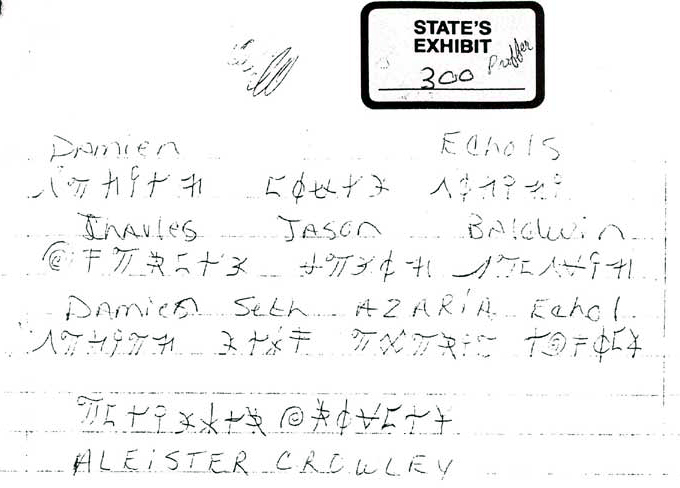 Coded alphabet. Identified at trial by Echols as his writing. The English translation is in another hand and incorrect. Other books The prosecution obtained a search warrant for the local library to find what occult books Echols, Misskelley, Baldwin and Teer had checked out. They found two that had been checked out by Echols, Magic by Maurice Bouisson and Cotton Mather On Witchcraft. In one other book reference, Ridge made these alarming comments. Damien stated that his favorite
book of the bible was that of Revelations because of the stories in it
about what was being done by the devil and the suffering done by people
at the hands of the devil. [Echols interview summary, Detective
Ridge, May 10,
1993]
The inflammatory elements of this statement were passed over in Ridge's testimony. Fogleman: Did
he tell you which book of the Bible was his favorite
book?
Ridge: Yes, sir. He said the book of Revelations. [Detective Ridge testimony, Echols/Baldwin trial] In cross-examination Ridge was asked about the oddness of the question - not the response. Davidson:
When you asked him about what his favorite book of the Bible was,
that's when he told you Revelations, was.
Ridge: Yes, sir. Davidson: Was that a question that you asked other suspects in this case? Ridge: I don't remember asking that of anybody else, no sir. [ibid, cross-examination] Perhaps because there had been nothing presented in court that especially needed explaining, Damien was not questioned about this during his testimony. Continued in Echols Versus Ridge, Round Three  Jury notes, Damien Echols, Cons. "Wierd Satanic Follower - Anton Lavae, Alesister Crowley" |
![]()
|
Copyright
© 2008 Martin
David Hill
|
|
Site
Design By Michael
Gillen
|